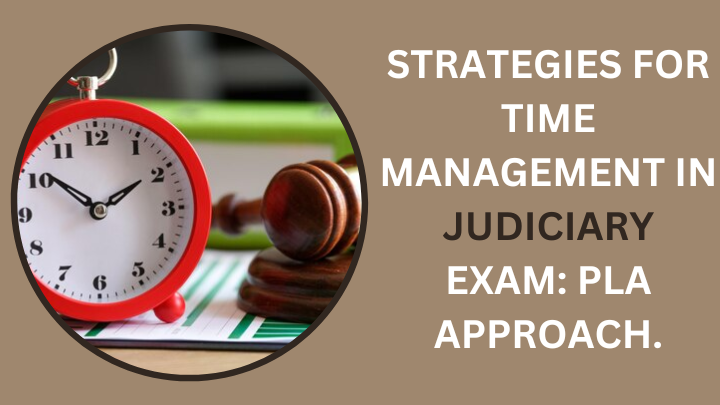Time management is essential in any examination, it helps in allocating sufficient time to each question, prevents last hour rushing, maintains focus and ensures that candidates complete the entire examination within the given timeframe. Time management contributes to a more organized and strategic approach, it also increases the candidate’s chances of answering all of the questions accurately and showcases his/her knowledge effectively.
Specifically, for competitive exam like judiciary time management becomes a very crucial aspect as judiciary examination involves complex legal scenarios and extensive materials, efficient time management allows the candidate to read and understand the questions, analyze the legal issues thoroughly, and craft well structured responses within the stipulated time. Time management is a strategic approach which ensures comprehensive coverage of the syllabus, demonstrates a candidate’s legal acumen, and maximizes their chances of success in the competitive field of judicial examinations.
Here are few strategies on how to manage time effectively:
- Understand the syllabus: The aspirants should familiarize themselves with all the topics mentioned in the syllabus of judiciary exam and divide them into categories based on subjects this helps in organizing study plan. Identify high weightage areas or subjects that carry more marks and focus on these initially to ensure a strong foundation. Allocate more time to challenging subjects. Include practice exams in your schedule to simulate exam conditions. This helps improve time management during the actual test. If there are any unclear topics then seek guidance from teachers/mentors through judiciary coaching institute either online or offline because clarifying doubts promptly ensures a smoother study process.
- Create a study plan: A Study plan provides a structured approach to your preparation, helping you organize the vast syllabus into manageable segments. Following a study plan promotes consistency in your study routine while preparing for Judiciary. Regularly assessing your progress through the study plan allows you to address weakness promptly and helps in preventing last minute struggles.
- Prioritize topics: Prioritizing topics in your study plan for a judicial examination is instrumental in effective time management because prioritization helps you allocate your study time efficiently and ensures that you don’t fail in covering the most crucial subjects and concepts first. Prioritization of topics optimizes revision as it helps in revisiting and reinforcing key concepts regularly. Doing this also ensures balanced coverage of the entire syllabus.
- Regular revision: Regularly revisiting previously studied material reinforces your understanding and helps in retaining information for a longer period. Frequent revision enhances your ability to recall information quickly during the exam and helps in saving time that might be wasted on trying to remember details. Regular revision ensures that you are well prepared for a judiciary exam without the need for intensive, last-minute cramming.
- Mock tests and practice papers: Mock tests and practice papers are crucial for time management in judiciary exams as they stimulate the actual exam conditions. They help you gauge the time needed for each section, improves your question-answering speed, and identifies areas where you may be spending too much time. Regular practice enhances your ability to manage time efficiently during the real exam, ultimately increasing your chances of success in the judicial examination.
- Identify weakness: Identifying weakness through mock tests in judiciary exams allows you to focus your efforts on areas that need improvement. By recognizing specific challenges or difficult topics, you can tailor your study plan to address the weakness more effectively. Doing this contributes to a more efficient and strategic time management strategy, which enhances your overall performance in the judge exam.
- Bullet notes: Bullet notes facilitate time management in judicial exams by condensing information into concise and easily digestible formats. They help in reviewing essentials points quickly, aiding swift comprehension during exam. By presenting information in a clear and focused manner, bullet notes contribute to concise answers, saving precious time and enhancing candidate’s ability to cover a broader range of topics within the exam timeframe.
All-in-all, we (Pahuja Law Academy) have crafted a well-structured study schedule by utilizing adaptive learning tools (promotes online and offline coaching) and prioritize subjects for judiciary exams strategically by incorporating regular revisions and mock tests which are held on Monday of every week. We also promote a proactive doubt resolution via online and offline classes which contribute towards a comprehensive studying approach. In essence, we have a disciplined and focused approach to time management as we prepare candidate’s for mains and prelims simultaneously by providing test booklets and online test series to ensure improved efficiency for Judiciary Examination.



